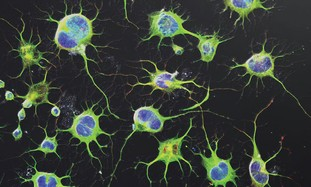
December 24, 2012
The Technion and AMIT (Alfred Mann Institute at the Technion) have established a new company for commercialization of stem cell technologies developed for over a decade at the stem cell research center headed by Professor Joseph Itskovitz-Eldor from the Bruce and Ruth Rappaport Faculty of Medicine. Professor Itskovitz-Eldor is a pioneer and a world leader in the field of stem cell research.
The company, Accellta, will market technologies that will enable commercial companies and research laboratories to culture masses of homogenous stem cell lines in a fast and cost-effective manner. The innovative technologies, developed by Professor Itskovitz- Eldor and Dr. Michal Amit, a senior researcher at the stem cell research center, address the need for employing genetic manipulation of the cells; although a highly desirable procedure, the latter is currently associated with poor outcomes. The revolutionary technologies introduced by Accellta enable to successfully manipulate the cells and
thus enhance the development of prospective stem cell-based therapies and disease models. In the future the company will also focus on regenerative medicine solutions and stem cell-based therapeutics for currently incurable diseases.
Professor Itskovitz-Eldor, Chair of the Department of Obstetrics and Gynecology at Rambam Health Care Campus and Director of the Stem Cell Center at the Technion, is internationally recognized as one of the founders of the field of stem cell research. In 1998, in collaboration with Professor James Thomson from the University of Wisconsin, he isolated the first human embryonic stem cells (hESCs), which is considered one of the most important scientific breakthroughs in medical history. In the same year, he established the first stem cell research laboratory in Israel, and currently holds the
largest number of scientific publications in the field of hESCs.
Since 1998, Professor Itskovitz-Eldor and Dr. Michal Amit have developed advanced stem cell technologies, including xeno-free and defined growth media, cell culturing scale-up methods, genetic manipulation techniques and protocols for induced differentiation of the cells into desired cell types; All of which fundamental to screening and testing of new therapeutic compounds. The Technion invested in a broad portfolio of patents to protect these promising inventions.
Accellta will operate in the global stem cell market, estimated at 2 billion dollars and double-digit annual growth. The market comprises mostly of products and services for stem cell research and development, as most stem cell technologies are still in development and have not yet been authorized for clinical use in humans. The stem cell market is expected to skyrocket in the coming years, once treatments currently under clinical evaluation receive approval from health authorities.
The Alfred Mann Institute at the Technion – AMIT, has been operating since 2006 to accelerate the development and commercialization of selected biomedical technologies invented by Technion scientists. The institute was founded by the initiative of American billionaire, Dr. Alfred Mann, who funds its activities and serves as Chairman of the Board of Directors. In addition to Accellta, AMIT also manages four other ventures, three of which have become start-up companies. According to Professor Itskovitz-Eldor, “The Company’s activities will facilitate the adoption by industrial and clinical entities of some of the world’s most innovative and advanced technologies for culturing pluripotent stem cells (both embryonic and
induced). These unique cells have the ability to generate any cell type of the human body. Our novel methods can also be used as a platform for the production of proteins and antibodies as well as for screening of novel therapeutics across a wide range of diseases. Accellta has already started establishing collaborations with a number of international companies.”

